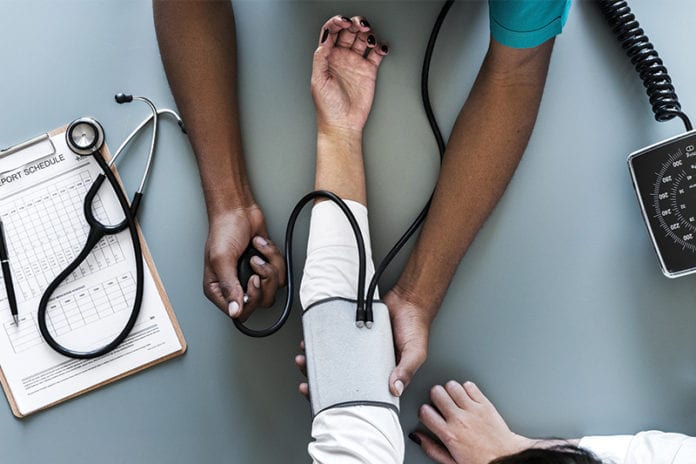Cuff devices for blood pressure measurement are inconvenient, and mobile device apps for blood pressure measurement that are now being introduced may lack accuracy.
To solve this problem, a team of Michigan State University scientists has created a new app and hardware for smartphones to measure blood pressure with accuracy that may rival arm-cuff devices. The technology, published in the current issue of Science Translational Medicine along with a video, also includes a discovery of a more convenient measurement point.
"We targeted a different artery, the transverse palmer arch artery at the fingertip, to give us better control of the measurement," said Anand Chandrasekhar, MSU electrical and computer engineering doctoral student and the lead author. "We were excited when we validated this location. Being able to use your fingertip makes our approach much easier and more accessible."
The approach uses two sensors: an optical sensor on top of a force sensor. The sensor unit and other circuitry are housed in a 1 centimeter-thick case attached to the back of the phone. Users turn on the app and press their fingertip against the sensor unit. With their finger on the unit, they hold their phone at heart level and watch their smartphone screen to ensure they're applying the correct amount of finger pressure.
"A key point was to see if users could properly apply the finger pressure over time, which lasts as long as an arm-cuff measurement," Ramakrishna Mukkamala, MSU electrical and computer engineering professor and senior author said. "We were pleased to see that 90 percent of the people trying it were able to do it easily after just one or two practice tries."
Internationally, this device could be a game-changer. While high blood pressure is treatable with lifestyle changes and medication, only around 20 percent of people with hypertension have their condition under control. This invention gives patients a convenient option, and keeping a log of daily measurements would produce an accurate average, discounting an occasional measurement anomaly, Mukkamala added.
The research team will continue to improve accuracy and hopes to pursue more comprehensive testing based on the standard protocol of the Association for the Advancement of Medical Instrumentation. The scientists are already making inroads to build improved hardware. Future iterations could be as thin as 1 millimeter and be part of a standard protective phone case.
What do you think? Ready to toss your cuff device and switch to an app? Share your thoughts in the comments section below.



I’m all for it. I wont have to have different cuffs to get reliable results (and still unreliable). If price is right and my doctor approves it, I will be purchasing. Keep me informed.
I like the idea. It will be good to take BP that way. I don’t have to have different cuffs to get reliable results. My husband is slightly obese and I have a small frame. I also can take my pediatric clients using the hardware with my smartphone app
This would be a great option for those with hypertension, and those who just like to know what their BP is. If the price for the hardware and app are similiar to what a digital BP monitor with cuff are, I feel people will buy it-as long as it well advertised and health care providers are aware of it.
Patients may be much more compliant with monitoring their BP with this system than with other, more complicated ways.